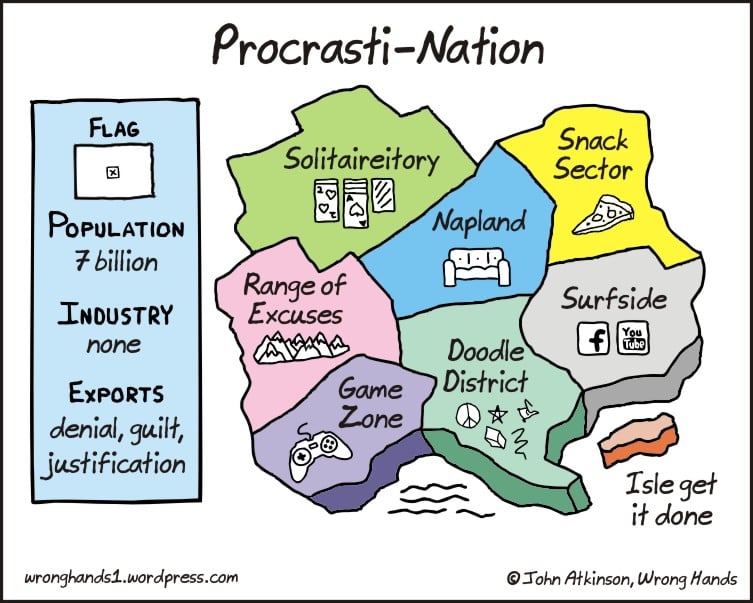Have you ever found yourself rushing to complete a task just a few minutes before a deadline?
Procrastination is often listed as one of the most common bad habits disrupting productivity. But there’s no need to feel guilty about it: putting of tasks doesn’t necessarily mean being lazy or slacking off. In fact, we just can’t help it.
And what if I told you… you can procrastinate and still be productive?
The science behind procrastination
We often talk on our social channels and here on our blog about how to get rid of procrastination: putting things off is definitely on the “Wanted” list of “bad productivity habits”. Obviously, if procrastinating becomes a chronic habit and workloads get out of control, it’s definitely bad news.
Unfortunately, science tells us that we literally can’t help it: our brains are biologically pushed to procrastinate.
Timothy A. Pychyl, a psychology professor at Carleton University, explains that animal instincts are dominated by the limbic system, one of the oldest and most dominant parts of the brain. It works on automatic: it tells you to pull your hand away from a flame, to “react for immediate mood repair”.
You can thank the prefrontal cortex for your procrastination habits: it’s the newest part of the brain and it allows you to integrate information and make decisions. While animals are basically motivated by instinct, humans have a more complex decision-making process.
“Does that mean that I can let go and helplessly embrace procrastination?”
Not yet.

Procrastinating with a purpose
To be clear: putting things off and repeatedly postponing tasks is a time-wasting, bad habit.
Besides, we can’t just “blame the brain”: very often, lack of direction, resources and clarity over a task is what stops us from starting things upright, even if we wanted to.
Author Frank Partnoy explains that some scientists have argued that there are two kinds of procrastination: active procrastination and passive procrastination.
“Active procrastination means you realize that you are unduly delaying mowing the lawn or cleaning your closet, but you are doing something that is more valuable instead.
Passive procrastination is just sitting around on your sofa not doing anything. That clearly is a problem.”
That’s what makes the difference: when putting things off, you can use that time productively by doing something that helps you achieve another (and sometimes greater) purpose.
How to put procrastination to good use
So, what can you do to keep your productivity up while putting things off (and not feel guilty about it)?
Do creative work
The moment we step in the office, to-do lists, yesterday’s tasks, and the email inbox all seem to be screaming demanding attention. An alternative way of starting the day is to put off all these things and start doing something creative first.
Doing creative work when we’re fresh and alert makes it easier to come up with great ideas. It gives your brain a boost and creates momentum that will last through the most dreaded tasks of the day.
Motivate yourself before a deadline
This one is tricky, so use it consciously. Some people work well under pressure, so postponing a task until it’s close to a deadline could be a tactic to get it done more quickly and effectively.
Be careful, though working with tight deadlines also creates stress. Besides, you never know what might show up unexpectedly in your schedule, messing up your plans.
Do something more important
Speaking of tasks showing up unexpectedly:
“Everybody has a plan until they get punched in the face” – Muhammad Ali
Planning and scheduling are important, but let’s face it: almost nothing ever goes as planned. Learn to set up your priorities but also be ready to reset and reschedule. If something more important comes up, take care of the newcomer, and then resume your work.
Work on yourself
Self- improvement is never a waste of time, so it’s perfectly OK to push something aside to learn something new, whether is catching up with the latest industry trend, learning a new skill or reading an article (or an 800-word blog post on procrastination, right?).
Take a break
There is just as much as our brain and body can handle. When done properly, breaks can reduce mental fatigue, boost brain function and creativity, and actually keep us on-task for longer periods of time.
As always, we’d like to hear from you: do you fight procrastination or do you embrace it? Make sure to let us know in the comments or send us a tweet @Timeneye.
Give it a try and sign up for a free 30-day Timeneye trial!